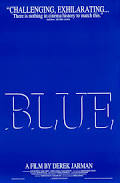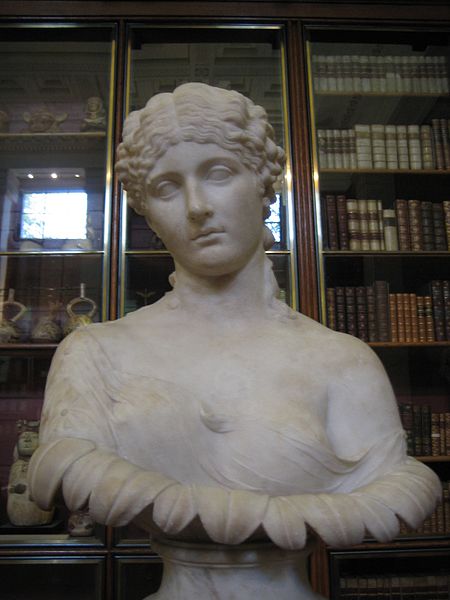
User:Neddyseagoon [GFDL (http://www.gnu.org/copyleft/fdl.html), CC-BY-SA-3.0 (http://creativecommons.org/licenses/by-sa/3.0/) or CC BY 2.5 (https://creativecommons.org/licenses/by/2.5)], from Wikimedia Commons
One of the things I love about the Arcade are the books, you never know what you are going to find either in the book section under the stairs or generally spread around the various stalls. On most occasions if I see a book then I purchase it, but I have not always kept to this golden rule and have found that when returning, that the book had been sold. I try not to do this, but I am weak of decision and sometimes I have too much faith in my own judgement. This happened to me just over five years ago when Caron and I were travelling to Dartmouth in Devon for a short summer break. As normal, we had given ourselves too much time so I decided to pop into the Arcade to buy a book to love. I had a ten minute window so I headed upstairs to see if I could find an interesting book. There were plenty of books and I chose a small book of poems which as its main theme dealt with Clytie and her doomed love for the Sun God.
As most of us know, the God deserted her and she changed into a heliotrope (which has the most delicious smell but is also quite poisonous). She followed him across the summer sky and wept when the night fell deep. I thought these poems about the sad ocean nymph would be a good companion on my journey towards gentle Dartmouth.
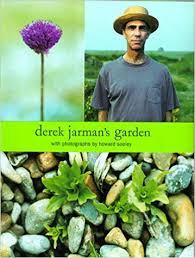 It was as I was leaving I spotted a copy of Derek Jarman’s Garden, a book that I had been trying to find since its initial publication. And then I made my fatal mistake and returned the book to the shelf. My reasoning was wafer thin. Caron and I were quite loaded up as we normally travelled with the kitchen sink when taking short breaks and although Derek’s book was not that big, it might have inhibited progress. Tiny Clytie fitted into my shallow pocket.
It was as I was leaving I spotted a copy of Derek Jarman’s Garden, a book that I had been trying to find since its initial publication. And then I made my fatal mistake and returned the book to the shelf. My reasoning was wafer thin. Caron and I were quite loaded up as we normally travelled with the kitchen sink when taking short breaks and although Derek’s book was not that big, it might have inhibited progress. Tiny Clytie fitted into my shallow pocket.
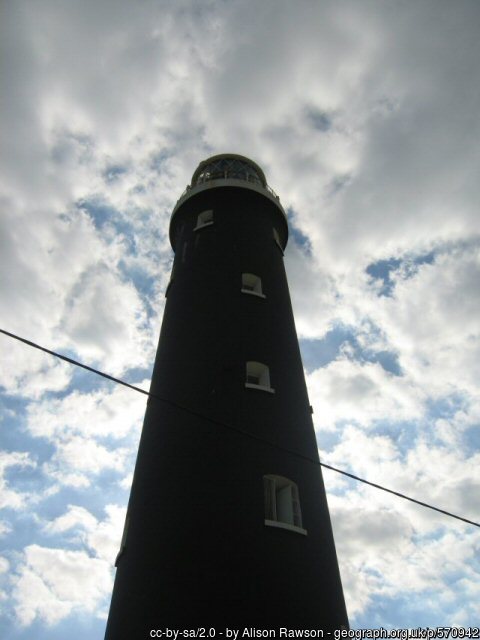
The Old Lighthouse cc-by-sa/2.0 – © Alison Rawson – geograph.org.uk/p/570942
The obvious happened and when I returned to the Arcade a week or so later, it had been sold. But why was I so keen on the book? The reasons are twofold as I am fascinated by Dungeness (which is geographically supposed to be the only desert in the UK). If you have ever visited Dungeness you will know what I mean. The whole place is unworldly; you feel that you have arrived in a strange world much divorced from rural Kent. It is peninsular and the sea is everywhere to be seen and if the conditions are stormy, it gives one the feeling that they are trapped in a shingle saucer that is floating out to sea. Everything is so austere apart the magnificent lighthouse and the not so magnificent nuclear power station. The whole landscape is dotted with odd shacks and wooden cottages as well as some ancient converted railway carriages. This is what must have attracted the late Derek Jarman (1942-1994), a film director whose work I admired greatly.
Derek was not just a film director, but was also a stage designer, an artist and a talented gardener and writer. Whilst his films may not have been to everybody’s taste, I found them fascinating, he was a breath of fresh air in the world of British cinema. From Sebastiane in 1976 to Blue in 1993, his films were constantly unusual and challenging, I particularly liked the Anarchistic Jubilee (1977) and Wittgenstein made also in 1993. If a topless Queen Elizabeth the First or a movie about one of the greatest philosophers of the twentieth century did not float your boat, then I could not see that you would have liked his movies. You either liked them or hated them.
In 1986, Derek was sadly diagnosed as HIV Positive which he knew to be a death sentence. It was while he was scouting for locations for his movie, The Last of England (1988) that he found himself in Dungeness and was immediately seduced by the area. My researches indicate that Derek was driving around the peninsular with Tilda Swinton and another friend when he came across Prospect Cottage which had been built in 1900 for a local fisherman. He purchased it soon afterwards. It was timber built in a somewhat vernacular style and was protected from the moods of the weather with a black tar based paint (there are a few to be found on Dungeness). On the side of the cottage there can be seen the opening stanza and the last five lines of Donne’s poem,The Sun Rising, which adds to the strangeness and the beauty of the residence. The canary yellow window frames and door frames add to the display. But although the cottage is a joy to behold, it was Derek’s garden that brought fame to Prospect Cottage.
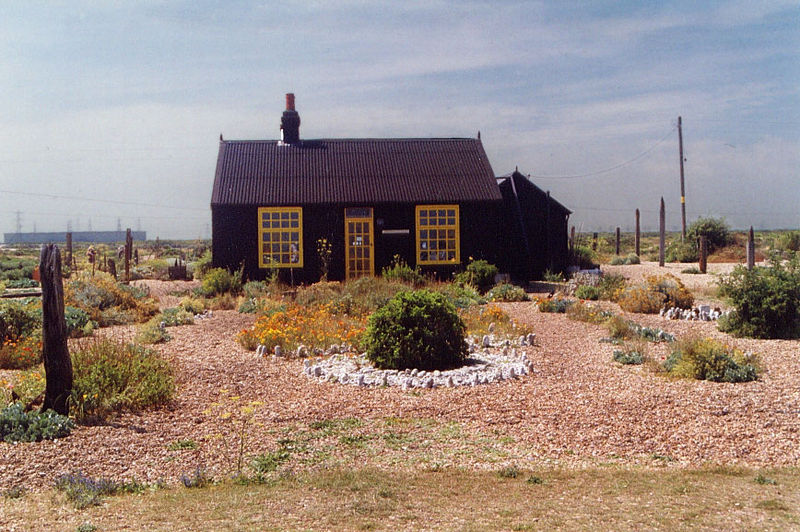
By Lancevortex [GFDL (http://www.gnu.org/copyleft/fdl.html) or CC-BY-SA-3.0 (http://creativecommons.org/licenses/by-sa/3.0/)], via Wikimedia Commons
In his declining years, Derek turned the garden into a unique experience using flotsam which had been washed up nearby with local salt loving beach plants.
He used this to great effect against the bright weather-washed shingle.
Debris from the last war was also used in this cultivated but artistic garden.
The result was stunning mixed with the unique light of the area (this has to be experienced to be believed).
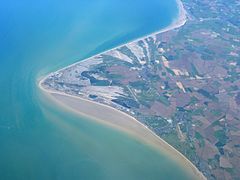
By Kim Traynor [CC BY-SA 3.0 (https://creativecommons.org/licenses/by-sa/3.0)], from Wikimedia Commons
I was in Dungeness just over a month ago during the memorable summer that we have just experienced. We travelled on the brilliant miniature railway from Hythe and found ourselves facing a tall decommissioned lighthouse. It was so hot that the shingle was shimmering, almost masking the day visitors who were walking lazily around the area. We had about two hours to spend at Dungeness as my daughter did not want to get caught up in the rush hour traffic in Dover. Caron, Jenai and Willa decided that they would seek refreshment before exploring the peninsular. But I was not in the need of refreshment so after a brief visit to the lighthouse we went our separate ways.
As I was not sure of my Jarman geography, I walked towards the impressive but sinister power station before a kind artist gave me concrete directions. Prospect Cottage was about half a mile away and soon I was walking along the lonely but scorching road to the left of the small railway station.
The actual journey to Derek’s cottage was just as much of an experience as the actual discovery of Prospect Cottage. I felt that I was walking along a dusty road in Spain surrounded by an endless desert, but I was not as the sea was always within view.
After about twenty minutes, I found Prospect Cottage and was surprised that it was very much the same as it was when Derek died in 1994. This said, the famous garden looked to have aged and maybe some of the brightness had faded. I only viewed it from the road for obvious reasons and took a few photographs.

By Gorup de Besanez [CC BY-SA 3.0 (https://creativecommons.org/licenses/by-sa/3.0)], from Wikimedia Commons
The woman who ran the gift shop in the lighthouse was local and she told me that for somebody so well known, Derek was a very unassuming person. She said that he was frequently visited by admirers and always took time to make them welcome and feel wanted. His garden had brought even more attention to Dungeness which lasts to this day. I thought of his time here in the shadow of the power station in this liberating but strangely claustrophobic landscape.
My wife and daughter (but not my granddaughter) thought me mad when I met them on one of the wooden walkways that led to the sloping beach. We spent a little more time in Dungeness before we returned to Hythe. It was as we left the station that I realised how close Prospect Cottage was to the railway and this added to the magic. It was a memorable visit.
Yesterday, I was twenty-one again and amongst my lovely presents was copy of Derek’s book which was a great surprise. I had not seen another one in the Arcade since that day, but it is likely that I will find another copy on my next visit. But I will not purchase it. I will leave it for you to find and this might prompt you to visit the wilderness of Dungeness which in its way, is at the end of the world.
If you do, please visit Derek’s cottage and think for a while of this unique man and the vision that he shared during his time amongst us.
Happy Hunting
Stuart Miller-Osborne
